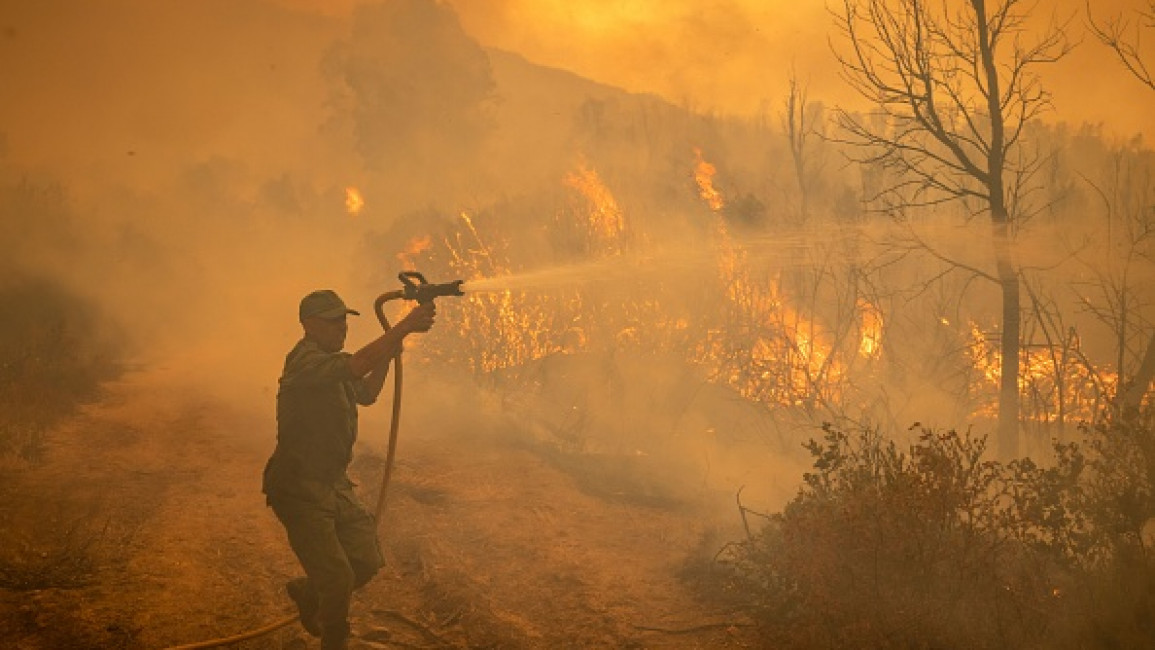'Tears and prayers': Moroccan villagers fight wildfires with faith and solidarity
"We lost everything. Now, we have only God," Saadia remarked as she watched her small house in Douar Laazib, a few kilometers far from Ksar el Kebir city in northern Morocco, turn to ash.
Like Saadia, thousands of families in northern Morocco have lost their fields, homes, and livelihood as wildfire devoured more than 6,600 hectares of remote mountain forests.
By Monday, firefighters and locals had managed to extinguish more than 70 per cent of the wildfires near the cities of Larache, Ouezzane, Tetouan, and Taza.
A total of eight Turbo Thrush planes were deployed, along with five Canadair planes.
Some 2,000 personnel, including the civil defence, the gendarmerie and the army, were joined by volunteers who were the first on the scene to combat the flames.
Despite deploying surveillance drones to spot fires, Moroccan authorities said firefighters are struggling to contain the fires for the seventh straight day.
As the temperature is predicted to reach between 41 and 46 degrees Celsius during the remainder of this week, the devastating fires seem far from over.
So far, the fires have killed one person and forced authorities to evacuate more than 1,000 families across 20 villages.
Despite these measures, the damage is severe.
During the past few days, thousands of villagers around the region helplessly watched the fire devour their life savings.
Most villagers in the region make their living by selling their harvest and livestock.
Already hit by a severe drought wave, the wildfires have exacerbated the situation.
"I lost two fields of olives. All livestock that we have. All the food in my house. I have nothing left but God," Saadia told The New Arab.
Severely affected are underprivileged villagers who lived in houses built of mud and thatch, which are flammable.
Many villagers surveyed their scorched properties and echoed, "O Allah, I seek refuge in you from grief and sadness, from being overcome by debt and overpowered by others."
Abdellah, a young Moroccan man who came from the nearby city of Lkssar Lkbir to lend help, said many villagers broke down mentally as they watched their life savings go up in smoke.
"They took some people to the hospital as they had severe mental breakdowns. Many others are staying at the mosque as they have nowhere to stay. Their houses are gone," Abd Lkbir said to The New Arab.
Many other young people hurried from nearby cities, bringing food and drinking water to help struggling families. Meanwhile, several volunteers went with authorities to help extinguish the ongoing fires.
Under the hashtag "Save them, help them", tens of Moroccan citizens who live nearby the affected area welcomed evacuated families into their houses.
Through volunteering, donations, prayers, or giving free lifts to the evacuated villagers, locals have joined forces to face the wildfires. Meanwhile, the Moroccan government has not announced yet any official aid package to the affected villagers.
Official figures show that Morocco has seen 165 fires since the beginning of the year.
Last year, 2,782 hectares of Moroccan forest were wiped away by 285 fires that broke out between January and September, mainly in the mountainous Rif region.
Attack Morocco, a movement focused on human rights, has issued an official press release calling on Moroccan activists to stop treating environmental issues as "an intellectual luxury".
"The matter is not an intellectual luxury. Rather, we have entered the eye of the storm of the environmental crisis, and we will collectively pay a heavy price if we do not deal with it properly: seeking to change the existing production and consumption system," said the movement.
The Moroccan movement pointed the finger at "the capitalist mode of production (the exaggeration in the production of goods and commodities that exceed the needs for the sake of profit), distribution and consumption" as the main spark behind this latest tragedy in the kingdom.
Fires have also raged in southern Europe, from Spain and Portugal to Greece and France, where high temperatures are breaking records on Monday.
In February, the United Nations Environment Program said the planet's rising temperatures are turning "landscapes into tinderboxes", as they warned of a "global wildfire crisis" in the coming decades.
Despite all the warnings, worldwide politicians have failed so far in securing a significant deal to limit the rising temperatures.


![President Pezeshkian has denounced Israel's attacks on Lebanon [Getty]](/sites/default/files/styles/image_684x385/public/2173482924.jpeg?h=a5f2f23a&itok=q3evVtko)



 Follow the Middle East's top stories in English at The New Arab on Google News
Follow the Middle East's top stories in English at The New Arab on Google News


